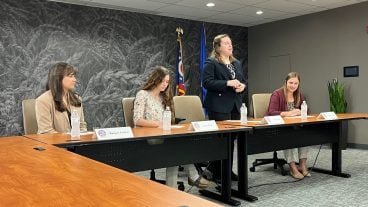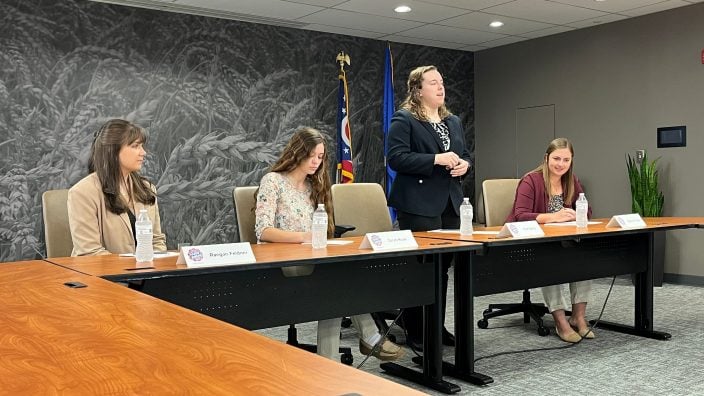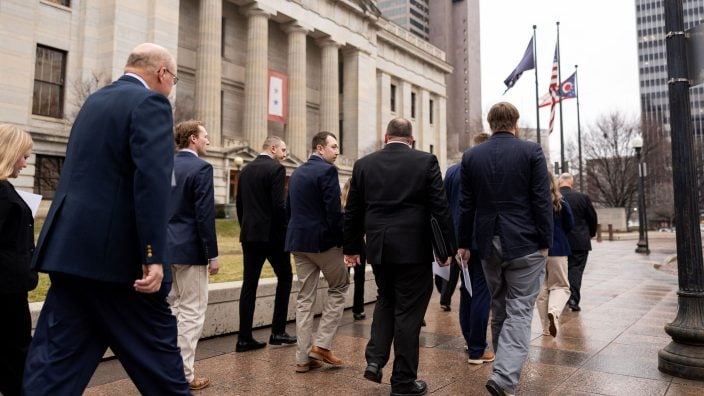Applications for Ohio Farm Bureau Health Plans now available
Members have three ways to apply: contacting a certified agent, calling 833-468-4280 or visiting ohiofarmbureauhealthplans.org.
Read MoreThe passage of the Consolidated Appropriations Act, 2018 signed into law by President Trump March 23 was a win for farmers. Along with clarifying requirements on electronic logging devices and Comprehensive Environmental Response, Compensation, and Liability Act (CERCLA), the budget bill also addressed the cooperative tax deduction discrepancy, rural broadband needs and funding for career and technical education, among others.
“Undoubtedly there has been a lot of confusion and uncertainty surrounding many of these issues, and we applaud Congress for listening to our concerns and working to try and quickly address them,” said Jack Irvin, OFBF senior director, state and national policy.
The federal spending bill is in effect though Fiscal Year 2018, which ends in September.
The budget legislation amends the cooperative tax deduction, Section 199A. This provision restores balance to commodity markets and re-establishes fairness between cooperative and noncooperative agriculture producers, retroactive to Jan. 1, 2018. Federal tax reform signed into law in December had included a gross sales deduction of 20 percent when selling to a cooperative only. This legislation returns to tax policy more closely aligned with what was in place before major tax reform was passed late last year.
The law creates a $625 million pilot program within the Rural Utility Service of the U.S. Department of Agriculture under the Rural Electrification Act. At least 90 percent of the households must be in a rural area currently without sufficient access to broadband to be eligible to receive a loan or grant under the pilot program. Ohio lawmakers are also working on broadband access legislation at the state level.
Perkins Basic State Grants received a $75 million increase within the legislation, a sign of support in Washington for career and technical education funding.
According to the Association for Career and Technical Education, in addition to the Perkins increase other programs that saw a bump within the budget bill included Student Support and Academic Enrichment Grants (ESSA Title IV-A), Pell Grants, work study programs and apprenticeship opportunities.
These issues were lobbied for when Farm Bureau county presidents visited Washington, D.C. in March and met with their legislators on Capitol Hill.


Members have three ways to apply: contacting a certified agent, calling 833-468-4280 or visiting ohiofarmbureauhealthplans.org.
Read More

Collegiate Farm Bureau serves as a connection to current industry professionals and equips the next generation with the essential tools and resources needed to excel in their careers.
Read More

Ohio Farm Bureau members met one-on-one with state legislators and staff to discuss policy priorities impacting Ohio’s farms and rural communities.
Read More

Legacy nutrient deductions enable new farmland owners to claim deductions on the nutrients within the soil on which healthy crops depend.
Read More

Farmers, agribusinesses and community members are encouraged to nominate their local fire departments for Nationwide’s Nominate Your Fire Department Contest through April 30.
Read More

Introduced by Sen. Paula Hicks-Hudson, SB 120 would establish the Urban Farmer Youth Initiative Pilot Program.
Read More

Gases, vapors, and fumes can all create risk. How can we measure and protect ourselves from them?
Read More

The Ohio Farm Bureau’s Young Agricultural Professionals State Committee has named its 2026 leadership and the individuals who will be serving on the state committee for 2026-2028.
Read More

The Ohio Farm Bureau Foundation has multiple scholarships available to Ohio students from rural, suburban and urban communities who are pursuing degrees with a connection to the agricultural industry.
Read More

With 100% bonus depreciation now permanent, farmers can deduct the full cost of a new agricultural building in the year it’s placed in service.
Read More